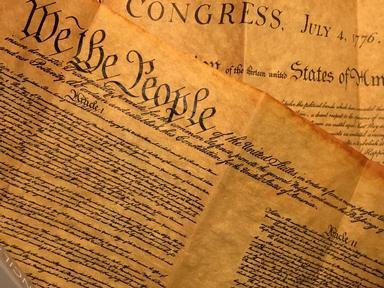Quiz Answer Key and Fun Facts
1. Prohibition of poll taxes
2. Non-enumerated rights retained by the people
3. Presidential Inauguration moved to January 20
4. Prohibition of cruel and unusual punishment and excessive bail
5. District of Columbia residents obtained the right to vote for President
6. Involuntary quartering of troops
7. Restricts the right of individuals to sue states in Federal Court
8. Voting age lowered to 18
9. Method of electing President and Vice President
10. Presidential term limits
11. Federal Income Tax
12. States rights/Federalism
13. Representatives cannot increase their own pay
14. Direct election of Senators
15. Right to jury trial in civil lawsuits
Source: Author
MariaVerde
This quiz was reviewed by FunTrivia editor
stedman before going online.
Any errors found in FunTrivia content are routinely corrected through our feedback system.
